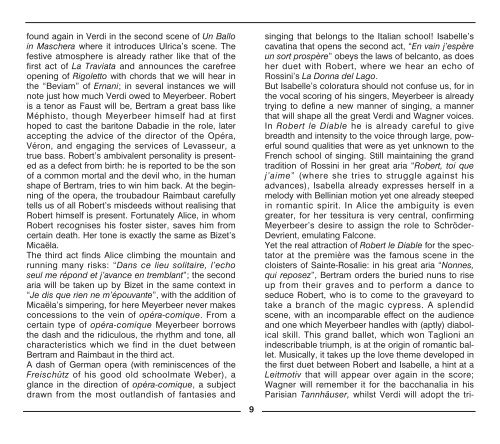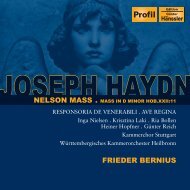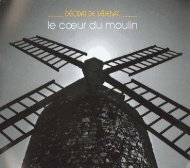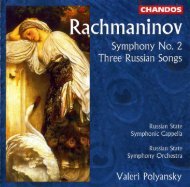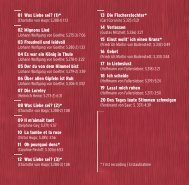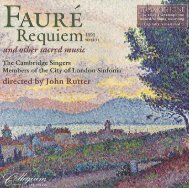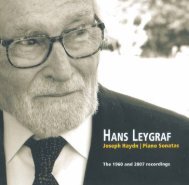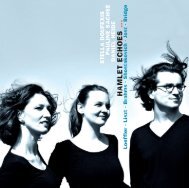ROBERT LE DIABLE
ROBERT LE DIABLE
ROBERT LE DIABLE
You also want an ePaper? Increase the reach of your titles
YUMPU automatically turns print PDFs into web optimized ePapers that Google loves.
found again in Verdi in the second scene of Un Ballo<br />
in Maschera where it introduces Ulrica’s scene. The<br />
festive atmosphere is already rather like that of the<br />
first act of La Traviata and announces the carefree<br />
opening of Rigoletto with chords that we will hear in<br />
the “Beviam” of Ernani; in several instances we will<br />
note just how much Verdi owed to Meyerbeer. Robert<br />
is a tenor as Faust will be, Bertram a great bass like<br />
Méphisto, though Meyerbeer himself had at first<br />
hoped to cast the baritone Dabadie in the role, later<br />
accepting the advice of the director of the Opéra,<br />
Véron, and engaging the services of Levasseur, a<br />
true bass. Robert’s ambivalent personality is presented<br />
as a defect from birth: he is reported to be the son<br />
of a common mortal and the devil who, in the human<br />
shape of Bertram, tries to win him back. At the beginning<br />
of the opera, the troubadour Raimbaut carefully<br />
tells us of all Robert’s misdeeds without realising that<br />
Robert himself is present. Fortunately Alice, in whom<br />
Robert recognises his foster sister, saves him from<br />
certain death. Her tone is exactly the same as Bizet’s<br />
Micaëla.<br />
The third act finds Alice climbing the mountain and<br />
running many risks: “Dans ce lieu solitaire, l’echo<br />
seul me répond et j’avance en tremblant”; the second<br />
aria will be taken up by Bizet in the same context in<br />
“Je dis que rien ne m’épouvante”, with the addition of<br />
Micaëla’s simpering, for here Meyerbeer never makes<br />
concessions to the vein of opéra-comique. From a<br />
certain type of opéra-comique Meyerbeer borrows<br />
the dash and the ridiculous, the rhythm and tone, all<br />
characteristics which we find in the duet between<br />
Bertram and Raimbaut in the third act.<br />
A dash of German opera (with reminiscences of the<br />
Freischütz of his good old schoolmate Weber), a<br />
glance in the direction of opéra-comique, a subject<br />
drawn from the most outlandish of fantasies and<br />
9<br />
singing that belongs to the Italian school! Isabelle’s<br />
cavatina that opens the second act, “En vain j’espère<br />
un sort prospère” obeys the laws of belcanto, as does<br />
her duet with Robert, where we hear an echo of<br />
Rossini’s La Donna del Lago.<br />
But Isabelle’s coloratura should not confuse us, for in<br />
the vocal scoring of his singers, Meyerbeer is already<br />
trying to define a new manner of singing, a manner<br />
that will shape all the great Verdi and Wagner voices.<br />
In Robert le Diable he is already careful to give<br />
breadth and intensity to the voice through large, powerful<br />
sound qualities that were as yet unknown to the<br />
French school of singing. Still maintaining the grand<br />
tradition of Rossini in her great aria “Robert, toi que<br />
j’aime” (where she tries to struggle against his<br />
advances), Isabella already expresses herself in a<br />
melody with Bellinian motion yet one already steeped<br />
in romantic spirit. In Alice the ambiguity is even<br />
greater, for her tessitura is very central, confirming<br />
Meyerbeer’s desire to assign the role to Schröder-<br />
Devrient, emulating Falcone.<br />
Yet the real attraction of Robert le Diable for the spectator<br />
at the première was the famous scene in the<br />
cloisters of Sainte-Rosalie: in his great aria “Nonnes,<br />
qui reposez”, Bertram orders the buried nuns to rise<br />
up from their graves and to perform a dance to<br />
seduce Robert, who is to come to the graveyard to<br />
take a branch of the magic cypress. A splendid<br />
scene, with an incomparable effect on the audience<br />
and one which Meyerbeer handles with (aptly) diabolical<br />
skill. This grand ballet, which won Taglioni an<br />
indescribable triumph, is at the origin of romantic ballet.<br />
Musically, it takes up the love theme developed in<br />
the first duet between Robert and Isabelle, a hint at a<br />
Leitmotiv that will appear over again in the score;<br />
Wagner will remember it for the bacchanalia in his<br />
Parisian Tannhäuser, whilst Verdi will adopt the tri-


